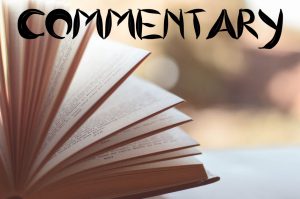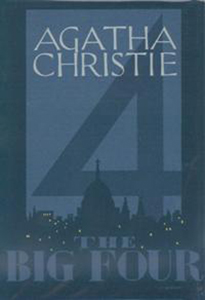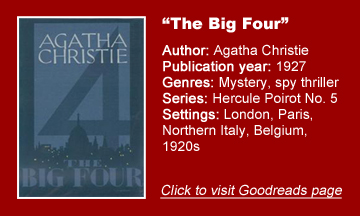Agatha Christie tries something new in “The Big Four” (1927), pitting Poirot against a global illuminati. I know it’s less successful than her single-site mysteries because I wasn’t drawn back to each sitting with the book for the whodunit, but rather for the oddity value.
“The Big Four” is strangely structured, with bizarre choices of emphasis as Christie shoehorns her strength – Poirot solves mini-mysteries, all of which feature The Big Four’s hand – into something she’d like to be good at (international intrigue), but isn’t quite. (Her interest in larger-scale crime is tipped in “The Secret Adversary,” but it’s more effectively in the background there.)
Poirot as James Bond?
This isn’t the ideal comparison, because 007 was invented later, but “The Big Four” plays like lightweight James Bond. We know what Poirot’s strengths are, in part because he reminds Hastings so often: using his little gray cells to see connections that Hastings (the narrator and audience surrogate) overlooks.
His boasts to Hastings, and the latter’s subsequent eye-rolling, are so ubiquitous in this novel that they are no longer amusing after a point. Christie is in need of a new tune.
Poirot’s strengths don’t usually include action heroism. Christie knows this, so even though “The Big Four” has an action-suspense plot, Poirot doesn’t come in guns blazing or fists flying.
He employs British agents, off-page and mentioned in asides, to achieve the ends that would be illustrated by spectacle and bombast in action novels and films.
The detective also employs schemes wherein he doesn’t consult Hastings, as he needs Hastings’ surprise to sell it to the enemy. This makes sense, in a cheeky way, but because Hastings narrates the novel, we too are in the dark, and it’s irksome.
In the biggest example of how this novel has so much happening off-page, Poirot’s associate Ingles learns of the location of The Big Four’s base in a side story we — and even Poirot himself — are never privy to.
Unusually long case
“The Big Four” is a decent portrayal of the Poirot-Hastings friendship, as Hastings leaves his beloved wife (named Cinderella, and never given any characterization) at their Argentina home in order to assist Poirot on this case from the latter’s London office/flat.
Making it weirder, this isn’t the type of case that’s wrapped up in a week or so; it spans months, maybe years. It’s suggested that smaller cases – perhaps some from “Poirot Investigates”? – happen in the margins. “The Big Four” must be a challenging novel for Poirot timeline-makers to account for.
The author gives Hastings impossible choices, including between the life of Poirot and the life of his wife when he’s held in London’s Chinatown by the operatives of Number One, a Chinese man who serves as the brains of titular quartet.
An American man (Number Two) provides the money, a French woman (Number Three) provides the scientific know-how and an English man (Number Four) is the master of disguise who carries out surveillance and hits.

They are like four Bond villains teaming up. I also couldn’t help but think of “Austin Powers” since one of them is named Number Two.
I wouldn’t be so snarky except that Christie declines to give personalities to any of these four villains – especially Number One, who isn’t even present at the final showdown at a supervillain base hidden in an Italian mountain.
She just tells us the Chinese man’s intellect rivals Poirot’s, and that he is the mover and shaker of every socio-political happening in the Far East.
Different, but not in a good way
Poirot has been well established as a genius, but Christie almost pushes that too far in “The Big Four.” But the bigger flaw is that she makes the global criminals seem dumb; they keep engaging Poirot’s attention – too often by having Number Four surveilling Poirot and being spotted.
I see what Christie is going for in “The Big Four”; she doesn’t want to have every book be about Poirot solving a murder in a mansion (although that does happen in a couple mini-mysteries amid the grander narrative).
The author is clearly fascinated by the possibilities of crime on a global stage, and the steps Poirot and his (off-page) UK government allies can take to combat such super-villainy.
So “The Big Four” is fascinating for being so different. But after reading it, I want to go back to murders in mansions.
Every week, Sleuthing Sunday reviews an Agatha Christie book or adaptation. Click here to visit our Agatha Christie Zone.


